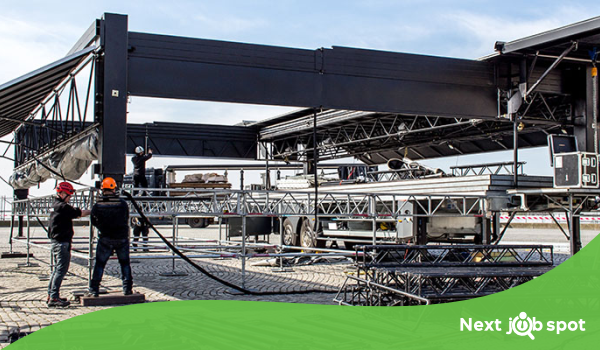
Working as Temporary Event Staff in South Africa is an exciting, high-pace entry into the world of conferences, concerts, and corporate functions. This role is a meritocracy: your reliability and energy are your greatest assets. This practical roadmap reveals how to transform your flexible gigs into a permanent, highly professional career.
We detail the clear career progression paths, from on-site crew to logistics coordinator and full Event Manager, showing you how to leverage your hands-on experience and professional network to become a respected operational leader in the dynamic ZA Events Industry
The Power of the Initial Position: Becoming an Operational Expert
Working on the ground at a major event—be it a trade show at the Sandton Convention Centre or a concert at the CTICC—is an accelerated masterclass in project logistics and operational efficiency. The skills you gain managing queues and setting up stands are the core competencies for Event Management.
How Temp Staff Skills Translate to Event Coordination
| Core Skill Gained (Temporary Staff) | Management/Leadership Application |
| Punctuality & Reliability | Vendor/Staff Management: Trusted to manage rosters, coordinate arrivals, and enforce strict timelines. |
| Setup & Breakdown Logistics | Site/Facilities Planning: Understanding the physical flow, technical requirements, and rapid turnaround needs of a venue. |
| Ticketing & Customer Support | Client/Guest Relations: Handling complex accreditation issues, managing VIPs, and ensuring flawless front-of-house operations. |
| Adaptability & Pressure Handling | Problem Solving: Remaining calm and finding solutions under tight deadlines or during live, unexpected event issues. |
| Teamwork in High-Pace Environments | Team Leadership: Coordinating diverse staff groups (e.g., bar, catering, security) to work towards a single goal. |
By mastering the chaotic, on-the-ground reality of an event, you gain the practical authority to direct others—a direct ticket to a supervisory role in ZA events.
Clear Career Tracks: From Usher to Event Director
The South African Events Industry progression is driven entirely by proven competence and networking. Your career accelerates with every successful gig you complete.
1. The Operations & Logistics Management Track
This is the most common path, focusing on the seamless execution and logistics of large-scale events.
| Career Stage | Focus Area | Key Responsibilities & Progression |
| 1. Entry-Level | General Event Staff (Setup/Ticketing/Ushering) | Physical labour, following instructions, customer service delivery. |
| 2. Mid-Level | Crew Chief / Team Leader | Supervising a small team of temps, overseeing a specific operational zone (e.g., registration desk or bar area), reporting to the manager. |
| 3. Specialisation | On-Site Coordinator / Logistics Assistant | Managing equipment inventory, liaising with venue staff, and finalising supplier delivery schedules. |
| 4. Leadership | Event Manager / Project Manager | Full oversight of event execution, managing multi-million Rand budgets, liaising with clients, and handling risk assessments. |
2. The Hospitality & Promotions Track
This track leverages strong people skills to move into high-end hospitality, marketing, or brand activation.
| Career Stage | Focus Area | Key Responsibilities & Progression |
| 1. Entry-Level | Food & Beverage Server / Hostess | Premium customer service, drink service, managing hospitality suites. |
| 2. Mid-Level | Brand Ambassador / Promotions Coordinator | Representing clients at corporate events, executing brand messaging, and managing smaller activation teams. |
| 3. Specialisation | Sales & Venue Liaison | Working full-time for a venue (e.g., a hotel or convention centre), selling event packages, and managing client bookings. |
3. The Technical & Production Track
If you show interest in audio-visual, lighting, or staging (often learned during setup), you can pivot into technical specialisation.
- Production Assistant: Assisting sound and lighting technicians, learning equipment setup, and managing power distribution.
- Stage Manager: Overseeing all elements on the stage, including talent, timing, and technical cues—a high-pressure, essential role.
The Acceleration by Training: Certifications and Networking
In the events world, your network often dictates your net worth. Combining field experience with targeted training is the ultimate accelerator.
Formal and Informal Training That Gets You Promoted
- Safety & Compliance Certification: Immediately seek accredited training in Event First Aid, Fire Safety, and OHS (Occupational Health and Safety). These certifications are often mandatory for supervisory roles and make you the first person agencies call.
- Hospitality and F&B Skills: Acquire basic Bartending Certificates or Food Hygiene qualifications. These easily increase your daily rate and open doors to more lucrative catering and hospitality gigs.
- Project Management Basics: Enrolling in short courses on Project Management Fundamentals or using tools like MS Excel for inventory tracking shows organisers you are ready to manage the budget and timeline aspect of events.
The Power of the “Freelancer Network”
Your best training is building your reputation. Every agency keeps a “A-list” of staff who are consistently reliable.
- Networking: Treat every gig as a networking opportunity. Politely introduce yourself to the Crew Chiefs, Project Managers, and Agency Owners. These are the people who will hire you permanently or promote you to a supervisory role on their next contract.
- Specialisation: Don’t just be a general assistant. Get known for a specific skill (e.g., “The best person for registration” or “The fastest at breakdown”). This specialisation guarantees repeat bookings and higher rates.
Where the Growth Happens: Agencies as Career Partners
The intermediaries that hire you are the gatekeepers to your career progression. They are constantly looking to fill their mid-level coordinator and Crew Chief positions internally.
- Staffing Agencies: Agencies are often looking for reliable, experienced temps to become Staff Coordinators—full-time salaried employees who manage the entire database and coordinate the logistics for hundreds of other temp staff. This is a direct corporate exit strategy.
- Convention Centres (CTICC, Sandton): Excelling on-site can lead to permanent roles within the venue’s Facilities Management, Logistics, or Exhibitor Services departments, which offer stability and benefits.
- Promotions Companies: Companies managing brand activations need Account Assistants who understand the logistics of putting a promotion together. Your knowledge of what works on the ground is highly valuable to their sales teams.
Turn Your Gigs into a Guaranteed Career!
You’ve got the energy, the experience, and the drive. The event industry is a meritocracy that rewards hustle and dependability with real opportunities for management and specialisation.
Ready to step out of the crowd and into a supervisory role? Register with a staffing agency today, prioritize specialized safety training, and start building your reputation as a future leader in ZA Event Management!




